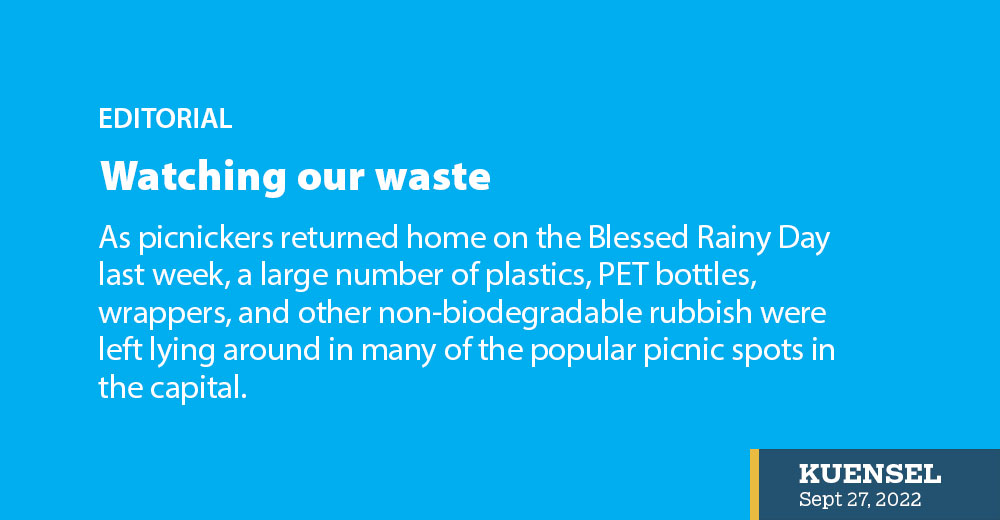As picnickers returned home on the Blessed Rainy Day last week, a large number of plastics, PET bottles, wrappers, and other non-biodegradable rubbish were left lying around in many of the popular picnic spots in the capital.
In some areas, volunteers have only cleaned the areas several days ago. Despite the efforts to manage waste better, there seems to be little impact.
Bhutan did not receive any tourists for more than two years during the pandemic. But we know that during this period waste along trekking trails did not get any lesser. In fact, in some places, it got worse.
The situation could get worse in Thimphu with more holidays and festivals ahead. Every year, many stalls selling all kinds of food, goods and clothes line up along the streets, most of them spewing out a large amount of waste every day.
Do we need them? The answer is that the people want it. Many of us are more interested in these stalls than the tshechu. Interestingly we are finding it difficult – in fact, it has been impossible – to find a compromise between the contrasting imagery of the sacred dances and the bazaar.
The issue seems to be the changing concept of entertainment and the way it is organised. And, if the public initiative is not having a positive impact – or even ruining – the atmosphere of our traditional festivals, it seems to call for a healthier initiative from the government.
The idea is not to kill the fun but to introduce the concept of healthy fun and a sense of hygiene in crowd entertainment. Every public gathering need not be accompanied by great volumes of unattended garbage. All we need, at this stage, are facilities as simple as waste disposal and toilets.
It means that thromde, dzongkhag and drungkhag authorities and the licensing authorities have to provide the space, infrastructure, rules, and discipline.
Societies around the world organise a diverse range of outdoor entertainment that is attended by millions of people. They do that without uncontrolled garbage, with toilet and water facilities, and with safety ensured for families with children. Why can’t we do that?
The problem seems to be worsening in our rural communities as well. Even as the villagers in Khandrothang in Samtse gewog try to keep livestock away from their landfill, we hear of Punakha farmers losing cattle to toxic waste at their landfill. With the landfills left open, farmers report their cattle often scavenge on toxic materials and die.
The gewogs say they don’t have either the money or the expertise to deal with something like this. But something needs to be done. In some cases, a decent barbed wire fence could help. Reducing waste and recycling at home could be effective to reduce the burden on landfills.
We cannot let the waste problem get out of hand. We have pledged our guests a high-end experience in Bhutan. With waste sprawling in our rural communities and across our popular sites, the experience would be anything but high-end.


